- Home
- Richard Matheson
Now You See It Page 8
Now You See It Read online
Page 8
My eyeballs rolled with startled speed.
Her right hand was stirring on the floor.
Now wait a second, said my mind.
The pounding on the front door stopped.
Cassandra moaned a little. Turned her head.
My eyeballs rolled again. (They were to get a real workout that afternoon, let me tell you.)
Outside the house, a man had appeared.
He was in his middle fifties, stocky, dressed in the hat and uniform of the local constabulary, a holstered pistol belted at his portly waist.
He peered into the room, shading his eyes with his left hand.
At first, he only looked around TMR, a frown of curiosity on his thick features.
Then he started, mouth gaping in surprise, as he caught sight of Cassandra.
Immediately, he charged back toward the front door.
Cassandra opened her eyes.
Confusion reigned in me. She wasn’t dead—or even incapacitated that I could see.
She had pushed up on one elbow.
As she did, the front door of the house was flung open, crashing against the entry-hall wall.
Cassandra gasped in startlement and looked around.
There was a rapid fall of boots across the entry-hall floor.
Cassandra twitched in alarm as the door was thrown open and the heavy man came bursting in.
He ran to Cassandra and knelt beside her hurriedly.
She stared at him in bewilderment as he helped her to a sitting position.
“Who are you?” she asked. I noticed that her voice was thick, the words slurred; an aftereffect of whatever drug had been on the dart, I assumed.
“Easy,” was all the man replied.
He assisted Cassandra to her feet, where she evidenced some difficulty with her balance and the focus of her eyes. “Easy, easy,” said the man.
“Who are you?” she persisted.
“Sheriff Plum,” he answered.
“Plum?” She stared at him for several moments, then pulled away; she immediately began to stagger.
Plum made a sudden move to prevent her fall. “Easy,” he said.
She blinked her eyes, grimacing, clearly struggling to regain the use of her senses. She swallowed, and it made a dry sound in her throat.
Disengaging herself once more, she stumbled toward the bar and fell against it, clutching at the top for support.
She stared at the bottles of chilling champagne as though the sight of them was baffling to her.
Then, shaking her head, she moved around the bar, holding on to its top to keep from falling.
Reaching the sink, she turned the faucet arm; cold water splashed down into the stainless-steel basin. Holding on to the sink’s edge with her left hand, she cupped her right beneath the fall of water, caught some, and began to wash her face.
At this point, Sheriff Plum, glancing around the room, caught sight of me. “Oh, my God,” he reacted.
Cassandra, face dripping, looked over at him hurriedly.
“Good afternoon,” the Sheriff greeted me.
“He can’t answer,” Cassandra told him. “He’s like a vegetable.” (What did I tell you?)
“A vegetable?” asked Sheriff Plum in a surprised voice.
“He had a stroke many years ago,” she explained, her voice still slurring words. “He can’t talk or move; ignore him.”
Which was pretty much my status in her mind.
“But—” Sheriff Plum gave up on me and looked back at Cassandra, who was drying her face with a bar towel.
“What’s going on here?” he asked.
She looked at him, then turned her head and scanned the room.
Each sight she saw appeared to puzzle her further. She rubbed her forehead hard as though to activate the gray cells underneath her skull. Ran her hands across her breasts as though to verify their presence.
“Are you all right?” the Sheriff asked.
Cassandra looked at him, disoriented. “Where did you come from?” she asked.
“What?” The question seemed bewildering to him.
She repeated it more demandingly.
“From town,” he said, still looking puzzled.
“I mean—” she broke off with an angry grimace “—who let you in?” she finished.
He looked more confused than ever.
“No one let me in,” he said. “The front door was unlocked. I came in by myself because I saw you lying on the floor in here and thought you were the ‘one’—”
He stopped as though perplexity was overwhelming him.
“Who got murdered, then?” he asked.
chapter 13
Cassandra did not reply at first. She stared at him, her features very nearly blank.
Finally, she asked, “How did you know about it?”
“Someone telephoned my office,” he replied.
“Telephoned your office?” (She was totally confounded now. So was I.)
“Yes—”
She interrupted him abruptly.
“My husband’s agent,” she declared.
“Your husband’s agent telephoned my office?” asked the Sheriff.
“No!” she cried in agitation. “My husband’s agent is the one who got murdered!”
“He’s the one …” Plum’s voice faded as he watched her curiously.
She’d begun to pace around, shaking her head and blinking hard.
“You want me to call for an ambulance?” he asked.
Cassandra stopped, wavering, and turned to face him.
“My husband did it,” she told him.
“Your husband—”
“—did it,” she cut him off.
He stared at her as though devoid of comprehension.
“Did you hear me?” she demanded.
“Yes,” he answered. “You said …”
His voice trailed off again as though he hadn’t inkling-one regarding what she’d said.
Cassandra ground her teeth together. She did that when she was furious.
“My-husband-murdered-his-agent,” she said slowly, spacing each word evenly, enunciating clearly.
Plum’s eyes narrowed. “You witnessed it?” he asked.
“Yes! Of course I did! Why else—”
Suddenly, she stopped and looked around the room.
“No, wait,” she said. “He wouldn’t do that. It wouldn’t make sense.”
The Sheriff was as nonplussed as I was, except that he could verbalize it.
“What wouldn’t make sense?” he asked.
Cassandra threw off momentary confusion with a willful scowl.
“I want you to arrest my husband,” she told the Sheriff. “I’ll testify to what I saw.”
The Sheriff’s expression did not, in any way, reflect a bulb turning on.
“Which was what?” he asked. (Rustic idiot, I thought.)
“I just told you!” snapped Cassandra, teeth grinding again. “My husband murdered his agent. Poisoned him!”
“Poisoned?” said the newly startled Plum; clearly, he could only deal with one brief bit of information at a time.
“Yes,” said Cassandra. “Yes. Yes. Arrest him and I’ll testify against him.”
“Regarding what?” he asked as though trying very hard to get it straight in his brain. Who elected this dolt? I wondered.
“You still don’t understand?” Cassandra said, incredulous.
Her insulting tone made him bristle.
“I mean, regarding how it happened,” he responded sharply. “Where it happened. When it happened. And if you have any notions about it, why it happened.”
The demands, though scarcely a barrage of them, seemed too much for Cassandra now. Shaking her head fitfully, she returned to the bar, lifted a handful of cracked ice to her face and rubbed it over her forehead as though to chill alertness and perception into returning.
Plum and I observed. I didn’t know what the worthy Sheriff was thinking, but as for me, I was trying hard to fathom
why Max would commit murder (down to one now), then notify the law and have it show up at his house.
I had to assume that it was done in a desire to pay for his crime.
Boy, was I wrong.
Done, Cassandra dumped the ice back into the bucket, blew warm breath on her palm, then turned to the Sheriff.
“I’m sorry,” she said. “Apparently I’m still drugged.”
“Drugged?” the Sheriff echoed, perplexity renewed.
She couldn’t hold her tongue. (I wonder if I could have.) “Did you think I was taking a nap on the floor?” she asked.
“Now see here—” Sheriff Plum looked grievously offended.
“All right, I’m sorry,” Cassandra said. “Forget it. I want you to arrest my husband for the murder of his agent.”
“Where did this happen?” the Sheriff asked.
“In this room,” Cassandra answered.
He gazed at her—much like a cow, it occurred to me—obviously waiting for elaboration.
She pointed across the room.
“My husband’s agent was sitting on the floor there. I thought he’d been shot—”
She broke off, wincing. “No, forget that,” she said, “it’s not important.”
“Not important?” Plum looked shocked.
“I’ll explain it later,” she responded tightly. “The point is that my husband’s agent was sitting on the floor over there when I brought him a glass of Scotch.”
“Wait a second,” Plum objected. “You brought him a glass of Scotch? I thought you said—”
“I didn’t know it was poisoned!” Cassandra cried. “Obviously, my husband had poisoned the Scotch! His agent was upset by what had happened—I’ll explain it later!” She cut Plum off. “Anyway, his agent asked me for a glass of Scotch, so I gave it to him. I had no idea it was poisoned.”
Sheriff Plum was rubbing his chin, his expression making it clear that all this was unclear to him.
“Do you get it?” Cassandra pleaded, looking at him with an expression halfway between appeal and contempt.
“Listen—” he started.
She couldn’t, and rushed on. “Where did it happen? In this room. When did it happen?” She looked at her wrist-watch, blinking exaggeratedly to make the tiny numbers come into focus. “Approximately two hours ago. Why did it—”
“Two hours?” Plum was aghast. “Why wasn’t I told sooner?”
“I was unconscious!”
“What about the man who called me?”
“I have no idea who called you! It must have been my husband, but why should he call you?”
My question exactly, I thought.
Cassandra’s voice had gotten very shrill, and the Sheriff gestured to calm her down.
“Take it easy,” he cautioned.
“How can I take it easy when my husband is a murderer?” she cried.
“Okay, okay,” said Plum. “Let’s get some evidence going, then.”
He gestured toward the room. “Where were you located when it happened?”
“Lying on the floor over there,” she answered, pointing toward the entry-hall door.
He winced as though reluctant to ask for elucidation lest it bring back confusion. But he had to know.
“And why were you … lying over there?” he asked.
Cassandra’s sigh was heavy. She must have seen no end to this; I didn’t. Still, it had to be dealt with eventually.
“Because I’d been shot,” she told him.
Seeing the flare of eye-glazed bewilderment on his face, she added quickly, “Not with a gun! With a blowgun!”
He stared at her.
“Oh, God,” she murmured.
Still, trying, she pointed toward the fireplace.
“You see the African blowgun hanging over the mantelpiece?” she asked.
Sheriff Plum looked in that direction. His expression did not indicate dawning perception.
“That thing hanging on the wall above the fireplace?” she asked. “Over the two dueling pistols?”
“Dueling pistols,” he muttered, still no glimmer in his eyes.
“That long thing?” she said, voice rising, “like a tube? A wooden tube?”
“Oh, yes,” he said.
“Thank God,” she murmured.
“Now, see here, ma’am,” he began.
“That’s what I was shot with,” she informed him, covering his words with hers. “It had a poisoned dart in it. No, no, I take that back! I don’t mean poison!” she added desperately, noticing a new confusion on his face. “Obviously, it wasn’t poison or I’d be dead. It must have had some kind of drug on its point. Something that paralyzed me, knocked me out. That’s why—”
She stopped, staring unbelievingly at the blankness of his expression. Local politics are at a very low ebb, I thought.
“This is going to last forever,” she mumbled.
You know, by now, how little regard I held for this woman. It is the measure of Plum’s density that I actually felt sorry for Cassandra.
She was watching as the Sheriff walked to the fireplace and took down the blowgun. He held it up to the window light to peer through it. “No dart,” he said.
“Do you actually think he’d put it back in there?” she snapped.
“Mrs. Delacorte, you’re giving me a lot of things to digest all at once,” the Sheriff said; he was beginning to sound a little grumpy now. “Let’s try to be polite to one another, shall we?”
Maybe there is a brain inside there somewhere, I thought. Deep inside, of course.
“You’re right, I’m sorry,” Cassandra repented. “It’s just that I’m so upset.”
“Of course you are.” He nodded. “Very well then. You were hit with a blowgun dart that had some kind of drug in its point—is that what you’re telling me?”
“That’s what I told you,” she responded, watching him return the blowgun to its spot above the mantelpiece.
“Now we’re getting somewhere,” he said.
I saw Cassandra cast an imploring look to the heavens just before Plum turned back to her.
“Where did it hit you?” he asked.
“Does it really matter?” she retorted.
“I’d like to know, yes,” he told her.
“Here,” she said, prodding an index finger at her right breast. (Was that a wince of embarrassment I saw on Plum’s face?)
He swallowed. “You’re lucky it didn’t hit you in the eye.”
Cassandra chose not to respond to that. What could she have said? “That’s a really stupid remark, Sheriff”?
“And your husband shot this—blew this dart at you?”
“Yes. Yes. To keep me from leaving the room after he’d poisoned Harry—”
She broke off as the Sheriff raised his hand as though to stop the traffic flow of new information.
“Harry?” he asked.
“My husband’s agent,” Cassandra answered.
“You never told me his name before,” he said.
“Oh, yes. All right. I’m sorry.”
“Okay,” he said. “Let’s get this straightened out, then.”
I know he heard her pitiful groan but decided to ignore it.
“Harry was sitting on the floor over there. You gave him the poisoned Scotch. Did he die right away?”
“No. I tried to get him on his feet to take him to the hospital. I couldn’t though; he had no control of his limbs.”
“All right.” Plum nodded gravely. “Now we’re getting somewhere.”
Was that a pitiful groan I heard in my own throat? Probably imagination. But the man was driving me nuts, along with Cassandra.
“You tried to leave the room—”
“To call your office,” she interrupted.
“It was you who called my office?”
“No!” she cried. “I said I was going to call your office! But before I could, my husband hit me with the dart!”
“Got you,” he said. “And that paralyzed you.”
“And saw this Harry—”
“Kendal. Harry Kendal.”
“Harry Kendal, right.” He nodded. “Now I’m getting the picture.”
Harry’s words flared brightly in my brain. Jesus H. Christ!
“You saw this Harry Kendal die before you lost consciousness?”
“Yes!”
“Okay.” He tried to mollify her with a gesture. “I’ve got it now.”
He frowned. “Except—”
A look of pained vexation took her face.
“—you said before, you thought this Harry Kendal had been shot.”
“Oh.” She nodded. “Yes. Apparently what happened was that my husband terrorized Harry with—”
“Terrorized?” he broke in.
“I said apparently because he fired one of those dueling pistols at him.”
“Then—”
“Let me finish,” she demanded, begging. “The pistol ball was obviously a fake one—made of wax, hollow, filled with blood. A magician’s gimmick.”
“I see,” said Plum. “And why would he do that?”
“I told you—to terrorize Harry.”
Plum’s voice seemed suddenly—surprisingly—aware as he inquired, “And why would he want to do that, Mrs. Delacorte?”
chapter 14
Cassandra didn’t—couldn’t—speak at first. Then she answered, “I don’t know.” Of course she did; we both did now. But she had no intention of letting the Sheriff know.
“No idea?” he asked; much as though he suspected the truth, although he obviously couldn’t have.
Cassandra tried deflection.
“Look, does any of this really matter?” she demanded. “My-husband-murdered-his-agent. Arrest him.”
“Please,” said Plum, “let me decide what matters and what doesn’t matter.”
She could only sigh in response. Heavily.
“All right.” He looked around. “Where is your husband then? I’d like to talk with him.”
“Talk with him?” She looked insulted. “What is there to talk about? He murdered Harry Kendal. Period!”
“Mrs. Delacorte,” he said, “these things have to be done in a certain way. I can’t just arrest a man because—”
“—some stupid woman tells you that he murdered someone,” she broke in coldly.
“That’s not what I was about to say,” he told her.

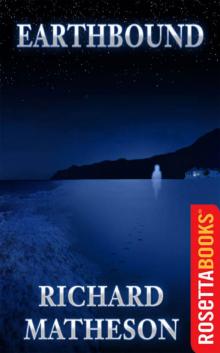 Earthbound
Earthbound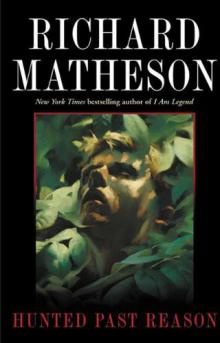 Hunted Past Reason
Hunted Past Reason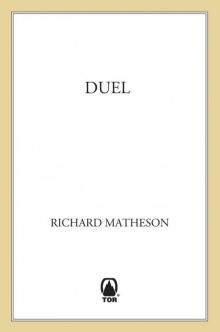 Duel: Terror Stories
Duel: Terror Stories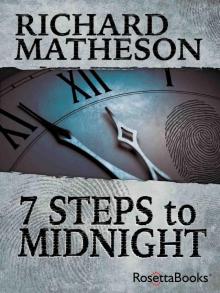 7 Steps to Midnight
7 Steps to Midnight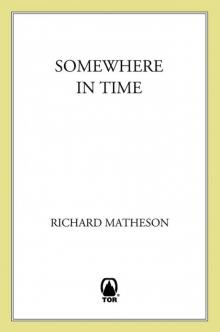 Somewhere in Time
Somewhere in Time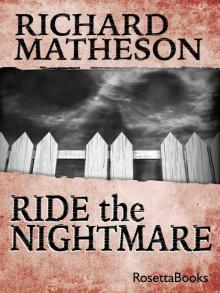 Ride the Nightmare
Ride the Nightmare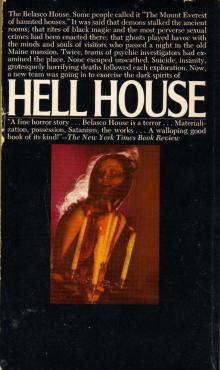 Hell House
Hell House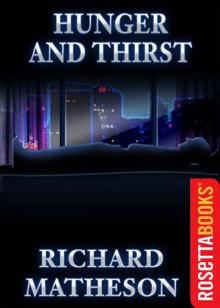 Hunger and Thirst
Hunger and Thirst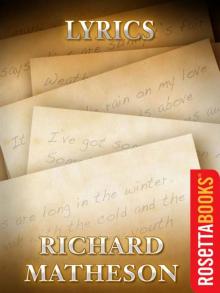 Lyrics
Lyrics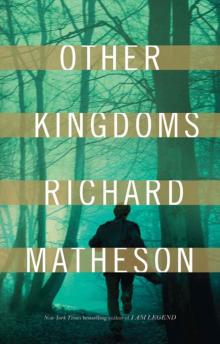 Other Kingdoms
Other Kingdoms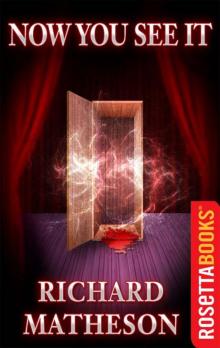 Now You See It . . .
Now You See It . . .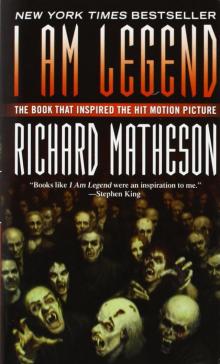 I Am Legend
I Am Legend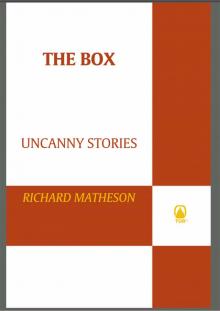 The Box: Uncanny Stories
The Box: Uncanny Stories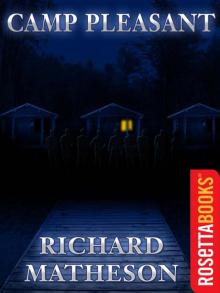 Camp Pleasant
Camp Pleasant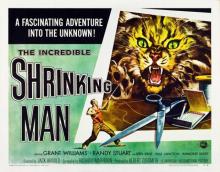 The Incredible Shrinking Man
The Incredible Shrinking Man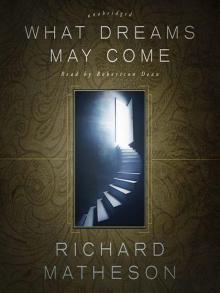 What Dreams May Come
What Dreams May Come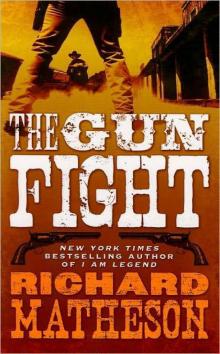 The Gun Fight
The Gun Fight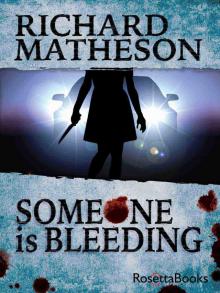 Someone Is Bleeding
Someone Is Bleeding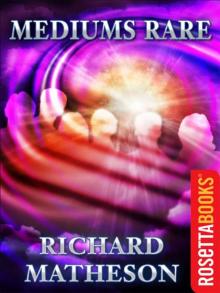 Mediums Rare
Mediums Rare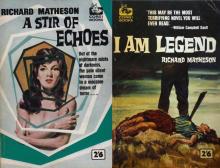 A Stir of Echoes
A Stir of Echoes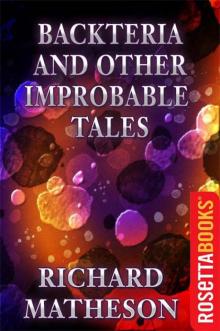 Backteria and Other Improbable Tales
Backteria and Other Improbable Tales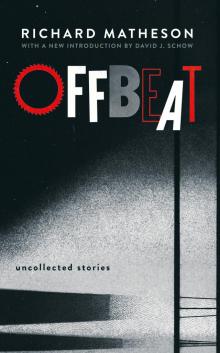 Offbeat: Uncollected Stories
Offbeat: Uncollected Stories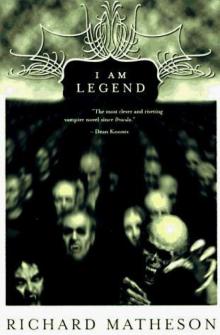 I Am Legend and Other Stories
I Am Legend and Other Stories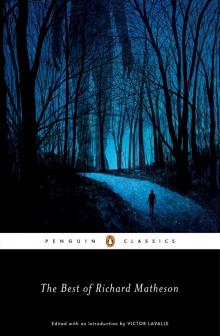 The Best of Richard Matheson
The Best of Richard Matheson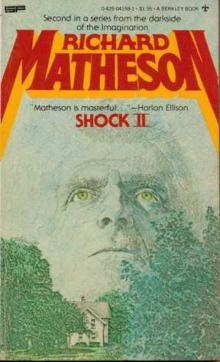 Shock II
Shock II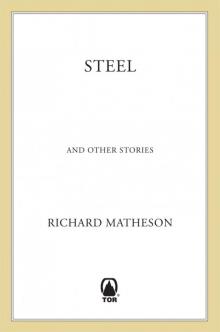 Steel: And Other Stories
Steel: And Other Stories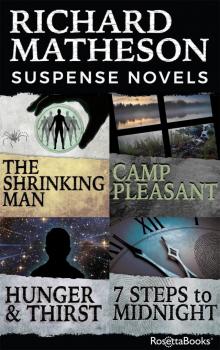 Richard Matheson Suspense Novels
Richard Matheson Suspense Novels The Link
The Link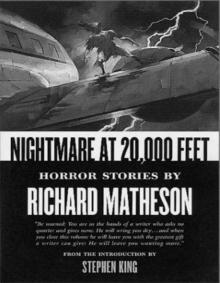 Nightmare At 20,000 Feet
Nightmare At 20,000 Feet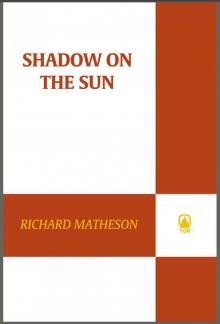 Shadow on the Sun
Shadow on the Sun![Steel and other stories [SSC] Read online](http://i1.bookreadfree.com/i/03/21/steel_and_other_stories_ssc_preview.jpg) Steel and other stories [SSC]
Steel and other stories [SSC] Created By
Created By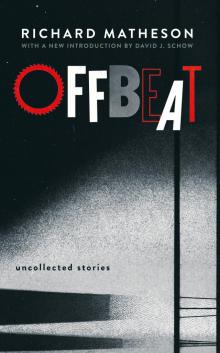 Offbeat
Offbeat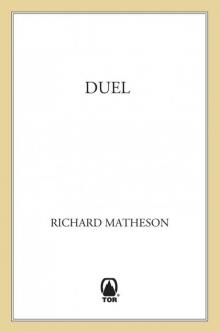 Duel
Duel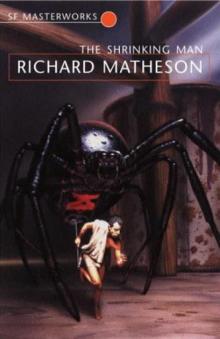 The Shrinking Man
The Shrinking Man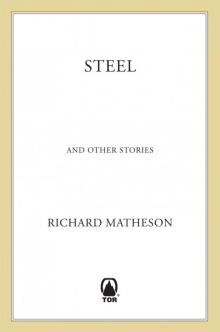 Steel
Steel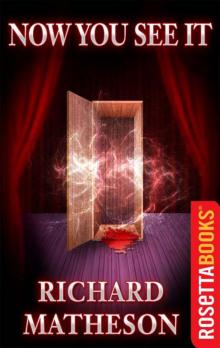 Now You See It
Now You See It